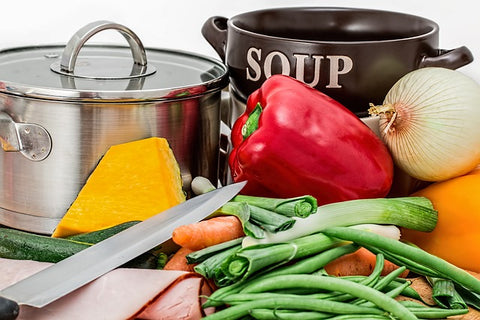As we age, our risk for certain diseases increases. A healthy diet becomes more important for our well- being as we age. Here are some tips to help us stay trim and reduce disease risk.
Food Choices For Healthy Weight

Healthy food reduces hunger and provides more nutrients for each calorie. Eat plenty of fruits, vegetables, low-fat dairy products, and whole grains. Skinless chicken, fish and nuts are good protein sources. Use olive oil for cooking - it is particularly healthy because it contains high levels of monounsaturated fats, which can lower cholesterol.
Try to limit or avoid:
-
Saturated fats - present in fatty beef, lamb, pork, chicken skin, cream and butter
-
Trans fats – present in baked good, cakes, cookies, pizza, margarine, doughnuts
-
Sugary foods and drinks
- Salty foods – potato chips, fast food
Foods like pork chops are OK to eat occasionally. For dessert, why not try strawberries with low fat whipped cream? When you get tired of water, you can drink 100% fruit juice (with no sugar added), other sugarless beverages or unsweetened tea.
For a healthy snack, consider mixed, unsalted nuts. Almonds may even promote weight loss. Finally, avoid eating in front of the TV, and use smaller plates to reduce the volume of food you eat.
Foods With Extra Nutrition Value
Broccoli is a great source of vitamins B6, E, B1 , and A. These are important for brain function, blood cells, defense against infection and eye health.
Broccoli is also rich in fiber, which helps digestion and keeps cholesterol low.
Berries (blueberries, strawberries etc.) contain antioxidants which may improve brain function. Antioxidants also decrease cell damage and might prevent Alzheimer’s disease.
Avocados contain vitamin C, which may protect against colds, cancers, heart disease, and diabetes. Avocados are a good source of fiber and essential minerals.
The essential minerals include calcium, copper, chromium, fluoride, zinc, iodine, iron, magnesium, manganese, molybdenum, phosphorus, potassium and selenium. They are critical for vitamin and hormone production, proper blood circulation, nerve and muscle function and bone strength.
Preventing Diabetes, High Blood Pressure, And Heart Disease
In addition to not overeating and keeping your weight down, try to keep alcohol consumption to less than 3 drinks per week (one drink = 1 2 oz. beer or 5 oz. wine or 1 .5 oz. of liquor).
White bread, white rice, potatoes, cakes, and many breakfast cereals are high in simple carbohydrates. These cause blood sugar and insulin spikes, which could lead to pancreas damage and lessen body's sensitivity to insulin, increasing the risk of diabetes. Whole grains (oats, brown or wild rice, 1 00% whole wheat, whole grain pasta etc.) are better choices.
Too much salt can cause high blood pressure. A safe amount of salt is 1500 mg of sodium/day (equals about 3/4 teaspoon). Avoid adding extra salt to food. Meanwhile, potassium helps keep blood pressure under control. Bananas, beans, yogurt, and fish are good potassium sources.
High cholesterol can also lead to heart problems. To keep cholesterol low, avoid processed meats like hot dogs, sausage, bacon, and deli meats.
Fish high in omega-3 fatty acids like salmon, cod, and tuna lower cholesterol and protect the heart.
Healthy Bones
Older adults, especially women, are at higher risk for osteoporosis (thinning of the bones). When women reach menopause, the levels of the hormone estrogen - which protects bones - decrease. Thin bones increase the risk of hip, spine,
and wrist fractures in the event of a fall. Vitamin D and calcium keep can bones healthy.
Vitamin D Requirements:
● Adults under 70 years: 600 IU/day;
● Adults older than 70 years: 800 IU/day.
Calcium Requirements:
● Adult men under 70 years: 1 ,000 mg/day;
● Adult women under 70 years: 1 ,200 mg/day; ● All adults over 70 years: 1 ,200 mg/day.
Foods like milk, yogurt, and cheese have calcium, but it is hard to consume enough to meet the guidelines. For example, to get enough calcium, you would have to drink 4 cups of milk (300 mg/cup) per day if you are over 70. Some people take calcium and vitamin D supplements to make sure they get the right amount.

